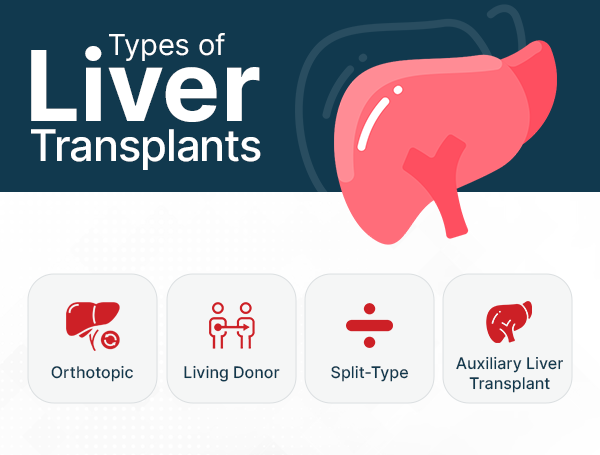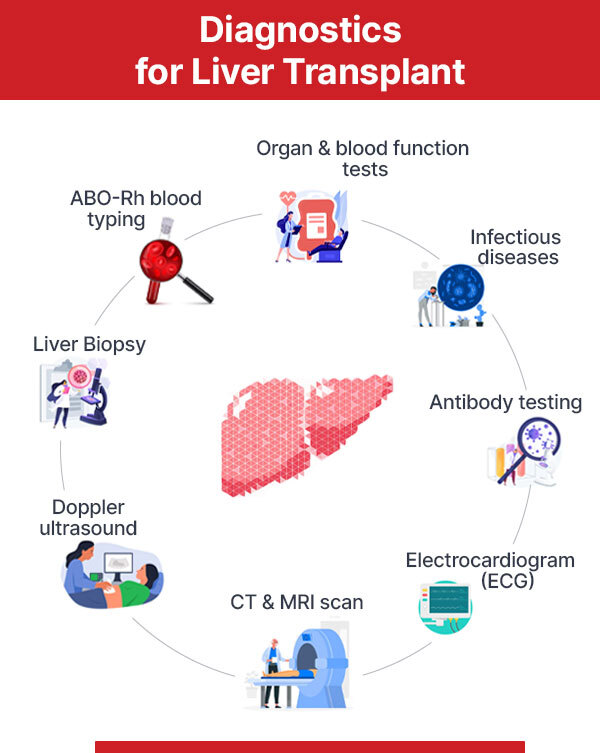In India, the initial expense of a liver transplant is USD 22,000 to USD 45,000. A study conducted in India found that following a liver transplant, the survival rate was 90% to 88% after a year and 75% after five. Most liver transplants are successful, and patients can resume their usual activities. Full recovery may take up to a year.
Types of Liver Transplantation in India and Their Cost

| Liver Transplant Types |
Cost in USD |
| Orthotopic |
$30,000-40,000 |
| Living Donor |
$23,000-35,000 |
| Split Type |
$30,000-40,000 |
Orthotopic Transplant: it is the most commonly performed surgery. In this, the entire liver is taken from a deceased donor who has passed recently and has no transmissible cancers or illnesses that may be transferred to the recipient. In this, an incision is made over the abdomen and the damaged or diseased liver is removed. Then the healthy donor liver is placed in the recipient and the bile ducts and blood vessels are connected. The incision is stitched back up with surgical staples or dissolvable stitches. To drain excessive fluids, drainage pipes or tubes are attached and are left for several days following the surgery. The starting cost for an orthotopic liver transplant is USD 30000-40000.
Living Donor Transplant: This means that the donor is alive and is willing to donate a part of their liver. They are operated on first as only a part, the left or right lobe of their liver is taken. The right lobe is larger and is recommended for adults whereas the left is smaller and is used for children. In this, the recipient’s liver is removed and then, the donor liver part is replaced with it. The biliary ducts and blood vessels are connected. After the transplantation, the placed lobe rapidly regenerates itself. Also, the removed part from the donor grows back. In the recipient, the new lobe grows to 85% of the actual liver size in a week. The starting cost for a living donor liver transplant is USD 23000-35000.
Split-type Liver Transplant: In this, the liver from a recently deceased donor is transplanted to one or two recipients. The donor’s liver is divided into a right or larger lobe and a left or smaller lobe. The donated liver regenerates and grows to its original size. Only the livers obtained from younger, more healthy, and slimmer deceased donors are considered and examined for split liver transplantation. The starting cost for a split-type liver transplant is USD 30000-40000.
Auxiliary Liver Transplantation: In this, the entire recipient liver is not removed. This is done to preserve the original liver in case of rapid recovery or for the future possibility of gene therapy (metabolic or hereditary diseases except Wilson’s disease or cancer).
- Hepatectomy – the liver is surgically resected in this. The tumors are removed from the cells of the damaged liver, called the hepatocytes, in cases of liver cancer which does not spread to other regions of the body.
- Combined liver and bile duct resection – this procedure is done to remove tumors that are located high in the bile ducts. The gallbladder and the common bile duct are removed. Later a small part of the small intestine is attached directly to the remaining portion of the bile ducts. Hence, the bile flows from the liver to the small intestine directly.
Cost Comparison of Liver Transplant with Other Countries
Pre and Post Medical Tests Cost for Liver Transplant

Pre-medical testing begins with the recipient’s examination. When the patient is found suitable for transplantation, potential donors in the family are tested accordingly. If no one in the family is suitable for transplant surgery, the patient is registered on the waiting list for deceased liver transplantation. This assessment lasts for 7-10 days.
>>Pre Tests
| Pre Medical Tests |
Cost in USD |
| ABO Blood Testing |
$3-5 |
| LFT |
$10-20 |
| KFT |
$8-12 |
| ECG |
$2-6 |
| CT |
$30 |
| Split |
$30-60 |
| MRI Liver |
$40-80 |
| HIV |
$2-5 |
| Hepatitis |
$3-6 |
| Liver Ultrasound |
$50-80 |
- ABO-Rh blood typing– the recipient’s blood group is tested with the donor’s blood group to determine if it is a match, based on A, B, O, and AB blood groups. The cost range is USD 3-5.
- Organ and blood function tests– Liver Function Test (LFT) and Kidney Function Test (KFT) are done to check the functionality and overall health of the enzymes, proteins, etc. synthesized by the liver. Complete a Blood Count test (CBC) to check the possibility of infections and clotting action. The cost range is USD 8-20.
- Infectious diseases– Viral disease testing for HIV, Epstein-Barr, hepatitis B, hepatitis C, and Hepatitis C are done to make sure there are no additional infections. The cost range is USD 2-6.
- Antibody testing– Complexes called antibodies form when there is a wrong blood transfusion or foreign cells enter the body. It is necessary to test these before transplantation, if formed later, the donor liver may be rejected. The cost range is USD 8-12.
- Other tests like Serum sodium levels, Calcium, and Vitamin D levels, Creatinine Clearance, Urinalysis, etc.
- Electrocardiogram (ECG) is used to examine cardiac arrhythmias, cardigan ischemia, etc. Cardiac stress testing is done to test Coronary Artery Disease (CAD) for patients over 40 years. The cost range is USD 2-6.
- A CT and/or MRI scan is done to examine the anatomy of the patient’s liver and how the blood vessels are attached to the liver. Sometimes the scan can identify the stage of cancer and ensure that cancer falls in the transplantation criteria. The cost range is USD 30-80.
- Doppler Ultrasound is performed to view the blood flow from and to the liver and to detect any abnormalities like masses or lumps. The cost range is USD 50-80.
>>Post Tests
The recipient’s immune system tries to reject and destroy any foreign object that enters the body. Immunosuppressive medicines are given to minimize this immune action. Regular check-ups are required after a liver transplant for some time. The post-operative recovery period is approximately 15-20 days.
| Post Medical Tests |
Cost in USD |
| LFT |
$10-20 |
| Liver Ultrasound |
$50-80 |
| Liver Biopsy |
$100-150 |
- Blood Tests– Liver function tests are done to check the functionality of the transplanted liver in the recipient’s body. The cost range is USD 10-20.
- Ultrasound– If there are abnormalities in the blood tests, the doctor may suggest an abdominal ultrasound. This is performed around 3 months after the liver transplantation. The cost range is USD 50-80.
- Liver Biopsy– This is performed in response to access changes in the enzymes of the liver and/or abnormal image results. The cost range is USD 100-150.

Are you struggling to find what you are looking for?
Get Expert's Callback
Factors Affecting Liver Transplant Cost in India
- Currency: the major factor affecting liver transplant is the less value of Indian currency. Hence, liver transplants in India are cost-effective.
- Hospitals: Indian hospitals are remarkably efficient in delivering excellent medical treatments. Some hospitals provide liver transplants at subsidized rates.
- Doctors: The doctors in India are some of the leading doctors in the world who practice in renowned hospitals in the country. Doctors here have a lower fee.
- Location and status of the hospital: Excellent facilities are available in both private and public hospitals. However, there is a longer wait in public hospitals. If patients have an urgent liver transplant, they can opt for private hospitals. The best hospitals in India are located in cities like Delhi, Chennai, Mumbai, Hyderabad, and Bangalore.
- Age: Liver Transplant is a complex procedure and is usually performed in older patients who suffer from chronic liver disease or acute liver failure. It may be required for some infants suffering from diseases like Wilson’s disease, Cholestatic disorders, etc. The younger patients require more elaborate treatment.
- Pre and Post-Treatment Medications: The recipient’s body is made a receptacle to the donor’s liver, a foreign organ, through long-term anti-rejection medications. Apart from the surgical procedure, the pre and post-examinations are charged separately.
- Rehabilitation and Physiotherapy: These may help patients with liver diseases and transplants to improve their quality of life through muscle strength improvement that prevents exertion and increases aerobic capacity.
Guidelines for a Liver Transplant in India
Guidelines for liver transplantation fall under The Transplantation of Human Organs Act, 1994. It applies to those States and union territories that adopt this act by a resolution passed in behalf of under clause (1) of Article 252 of the Constitution. It was amended in 2011.
- A close family is defined as a near relative in this THO Act. They can be parents, siblings, spouses children, and grandparents of the recipient. All of them can be donors as long as they are healthy, pass all tests for liver disease, and fulfill the requirements and guidelines by the law.
- The donor’s age should fall in the 18-55 age group
- The blood group of the recipient and the donor should be compatible
- Family friends, neighbors, well-wishers and staff are not acceptable liver donors
- Overweight people are not accepted as liver donors as they may have a fatty liver
- The donor liver should have enough in volume for the recipient and themselves after the surgery.
- The donor should have good mental and physical health overall. They have to undergo medical and psychological evaluation, and fully understand the complications and risks of the surgery before committing to donation.
- Donors need no objection certificate (NOC) from the state of domicile or embassy if they are near relatives or international nationals. The committee does not favor this much as there may or may not have been unnecessary monetary exchange.
For a deceased liver donor: After the evaluation process is complete, the patient information is sent to various hospitals to register them in the waiting for a deceased liver donor. The patient is checked periodically and notified immediately on the availability of the deceased donor.
Top Hospitals for Liver Transplant in India
India’s Renowned Surgeons for Liver Transplant
Watch the Patient Testimonial
Frequently Asked Questions
When the liver fails to function properly, it affects other organs in a major way. The liver becomes inflamed, leading to scarring of the tissues called cirrhosis. Cholestasis (bile flow stops), enlarged liver, genetic and autoimmune diseases, biliary atresia, hepatitis B or C, alcoholic or non-alcoholic liver disease or liver cancer can all lead to liver transplant.
The success rate of liver transplants in India is about 89% based on various studies. However, it may vary from 95-60% depending on patient to patient.
For top hospitals in India for a liver transplant, a patient should check hospitals that are accredited with JCI and NABH (world-renowned healthcare standards). The hospitals have advanced technology and modular operating theaters, a team of excellent surgeons, and a separate division for international patients.
To choose the best liver transplant surgeon in India, a patient should look for the experience, qualifications, success rates, and patient reviews for the doctor.
Rejection occurs when the immune system attacks the transplanted liver as it deems the new liver as foreign. It can occur even after taking immunosuppressive medications. If not taken, the rejection rate becomes higher. Medications should be taken as they are prescribed by the doctor. The rejection is maximum in the initial 6 months after transplantation. Chronic rejection occurs after 6 months of surgery and leads to bile ducts loss. Blood tests and liver biopsies can detect rejection.
Liver transplant recovery is a lengthy process, but most patients are able to resume their normal activities and have a healthier lifestyle. It may take up to a year to make a full recovery. Regular check-ups and prescribed medicines should be maintained.
A patient’s chance of survival is calculated through MELD score (Model for End-Stage Liver Disease) or how urgently a patient needs a liver transplant. Organ allotment is determined by the Organ Procurement and Transplantation Network (OPTN). The livers of deceased donors are allocated to the most sick patients first. The score varies depending on lab results and ranges between 6 to 40. Patients with a score lower than 15 are not added to the deceased liver donor waiting list as their chance of survival is better with a living liver donor. It is calculated through INR (internal normalized ratio), Bilirubin, Creatine and Serum Sodium. It is updated every week for patients above 25, every 30 days for patients of ages 19-24, every 3 months for patients aged 11-18, and once a year for patients aged 10 or less. The doctor decides whether a patient requires reevaluating MELD score.
The liver for donation can come from a living liver donor, who can be a family member or a friend or an unrelated person whose blood type matches with the recipient, or a deceased liver donor.
The patient can expect to be in the hospital for 7 to 14 days after the surgery. The initial days are spent in the ICU with comprehensive monitoring. If the recovery is progressing well, then the patient is released home after the patient is deemed strong enough and the immunosuppressant medication levels are satisfactory. The patient can resume their normal activities gradually. At first, fluids are delivered through drips. However, some patients may require dialysis immediately after liver transplant surgery.
The surgery can take up to 12 hours. For a living liver donor, the doctor first operates on the living donor (removes a portion of the liver that later grows to its original size) and then on the recipient. For a deceased donor, the patient is operated on directly. Lab tests are done for both kinds of donor prior to the surgery.
The prescribed medications are supposed to be taken for the rest of one’s life to prevent the rejection of the transplanted liver.
The lifelong outlook for a liver transplant is usually good. However, it may have potential complications, like any other surgery.
- Liver rejection
- Hemorrhage or bleeding
- The new liver may not work in the initial hours, requiring another transplant immediately.
- Vulnerability to infections
- Kidney function loss
- Complications inflow of blood to and from the liver
- The chance of certain kinds of cancer can increase
- Liver donation is considered rather safe with complications like any other major surgery.
- Probable allergic reaction to anesthesia or other medications
- Bleeding requiring transfusion
- Infection at the wound site
- Bile duct problems leading to bile leakage
- Formation of scar tissue
- Hernia
- Pneumonia
Recommended Reads:
Liver transplant: Symptoms, Classification, Diagnosis & Recovery
Kidney Transplant: Symptoms, Classification, Diagnosis & Recovery
Bone Marrow Transplant: Symptoms, Classification, Diagnosis & Recovery
Heart Transplant: Symptoms, Classification, Diagnosis & Recovery
Hemodialysis: Symptoms, Classification, Diagnosis & Recovery
Plasmapheresis: Symptoms, Classification, Diagnosis & Recovery




